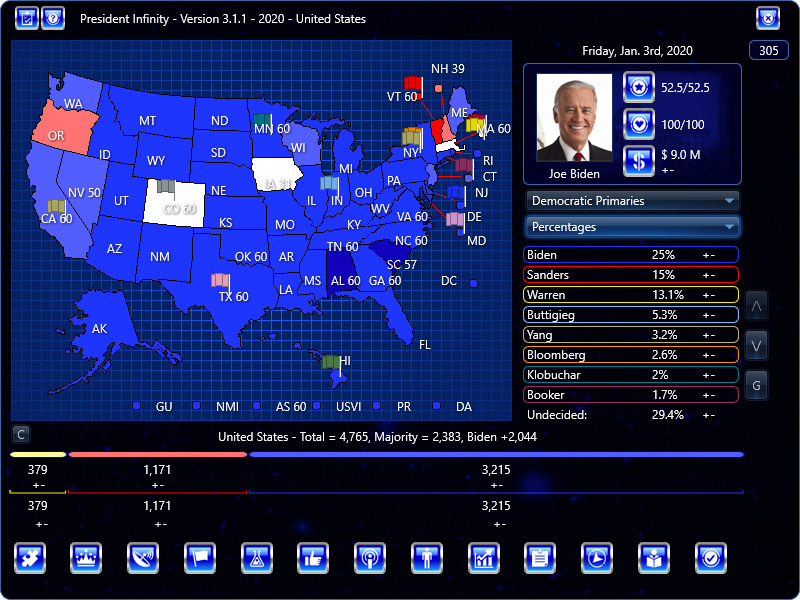
Playable Campaigns

This is a reprint of the feature essay from Issue #64 of Exploits, our collaborative cultural diary in magazine form. If you like what you see, buy it now for $2, or subscribe to never miss an issue (note: Exploits is always free for subscribers of Unwinnable Monthly).
———
I cannot imagine anything as alien in 2023 as conceptualizing politics as fun. Such an idea was alien twenty years ago, too, just not as much and not in the same way. Yet from then until now I have been playing a series of electoral politics videogames made by a company now known as 270sims. I play its latest iteration, President Infinity 2020, regularly, despite the fact that it is not quite fleshed out and a bit buggy.
Players are required to select election year scenarios and candidates within them – weighing their platform positions and strengths and weaknesses in traits like integrity, leadership and experience. Then, they attempt to guide the candidate to the White House by barnstorming, speechmaking, advertising, spinning and debating their way through presidential primaries and then, potentially, a general election.
The game can be painfully reflective of real life even when one tries to change history. Take, for instance, a recent 2020 campaign playthrough I undertook as Bernie Sanders where I tried my darndest to right the mistakes of the ‘20 Sanders campaign. As Sanders, who is armed with an impressive integrity trait of 9 out of 10, I was much less resistant to criticize Biden than the real-life Vermont senator was (and is), much more proactive about meeting voters in states like South Carolina and much more conscious about countering negative media narratives. No luck – I attracted nothing but negative stories from the national press while they slobbered all over Elizabeth Warren, Amy Klobuchar and Mayor Pete; my attempts to paint Biden as a pharmaceutical industry shill unwilling to bring needed changes to our CORRUPT HEALTH-CAH SYSTEM were in vain. I did win Iowa and Nevada, but I lost New Hampshire to Biden in between and at that point, I was fucked. South Carolina and Super Tuesday played out pretty much exactly as they did in real life and I – er – Bernie was forced to drop out during the early COVID lockdown period in spring 2020.

If you want to play as a cheat code, select Donald Trump in scenarios from 2016 onwards. His stats, as you might imagine, are all over the place – his integrity is a disastrous 3, but his charisma is a respectable 7. What makes him a cheat code – and this may sound faintly familiar – is his ability to suffer zero political consequences from scandals, gaffes, abominations, atrocities, insurrections, etc., thanks to his basically unheard of 7 in the “spin” category and strong numbers in other categories like “stamina” and “command.”
For reasons both related to the game and to our everyday lives, there are ethical considerations in choosing to play as Trump, much as there might be when, for instance on a more extreme level, playing as, erm, say, Germany in Hearts of Iron. But Donnie has so poisoned our discourse that concepts like “ethical considerations” can be slippery and secondary, if they are thought about at all.
I’ve long wondered if election simulation games like President Infinity could ever be viable for a widespread audience. But now I’m starting to worry if such games will soon be viable at all. Games have rules, and when fundamental parameters collapse, it is difficult to carry on. An official 2024 President Infinity scenario will not be able to account for simulated election results determined by sectarian violence, militant state legislatures overturning official vote totals nor long-term disputes about the winner that go beyond what we’ve seen in the aftermath of 2020.
Such things will corrupt the game and render it unplayable. And if the game is unplayable, what of the political junkies?




